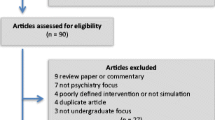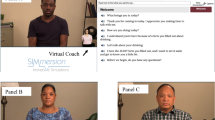Abstract
Purpose
Individuals with substance use disorders are besieged by stigma, within their community and also the broader social context. This stigma may also pervade interactions with health care professionals, preventing individuals with SUD from seeking treatment for medical and/or psychiatric conditions. Given the current opioid crisis, providers must be equipped with the skills to diagnose and treat individuals with SUD, as well as the ability to communicate in an empathic, nonjudgmental manner. While training in addictions has often been absent from medical school curriculum, increasing numbers of programs are incorporating such training. Simulation methods have been underutilized in mental health and addiction training. The present study sought to examine learner knowledge, perceptions, and confidence in treating patients with SUD and build upon existing findings regarding the utility of simulations in addictions.
Findings
Although research in this area is scant, the existing evidence supports the value of simulations to enhance clinical skills, learner confidence, and perceptions of individuals with SUD. Results of the present pilot study appear to support previous findings.
Summary
Simulation training methods appear to be a viable option to train providers to identify and treat individuals with SUD, while potentially combating stigma and increasing provider confidence and empathy.
Similar content being viewed by others
References and Recommended Reading
Papers of particular interest, published recently, have been highlighted as: • Of importance
Luty J, Fekadu D, Umoh O, Gallagher J. Validation of a short instrument to measure stigmatized attitudes towards mental illness. Psychiatr Bull. 2006;30:257–60. https://doi.org/10.1192/pb.30.7.257.
Luoma JB, Twohig MP, Waltz T, Hayes SC, Roget N, Padilla M, et al. An investigation of stigma in individuals receiving treatment for substance abuse. Addict Behav. 2007;32(7):1331–46. https://doi.org/10.1016/j.addbeh.2006.09.008.
World Health Organization (WHO). The International Statistical Classification of Diseases and Related Health Problems, Tenth Revision (ICD-10) Geneva Switzerland: World Health Organization; 1999.
Pfitzner K, Kapitany-Foveny M. Stigma of substance use in healthcare: a research on contact hypothesis. Dev Health Sci. 2018;1(2):44–8. https://doi.org/10.1556/2066.2.2018.14.
van Boekel LC, Brouwers EPM, van Weeghel J, Garretsen HFL. Stigma among health professionals towards patients with substance use disorders and its consequences for healthcare delivers: systematic review. Drug Alcohol Depend. 2013;131:23–35. https://doi.org/10.1016/j.drugalcdep.2013.02.018.
Ratycz MC, Papadimos TJ, Vanderbilt AA. Addressing the growing opioid and heroin abuse epidemic: a call for medical school curricula. Med Educ Online. 2018;23:1466574. https://doi.org/10.1080/10872981.2018.1466574.
Zhou C, Crawford A, Serhal E, Kurdyak P, Sockalingam S. The impact of Project ECHO on participant and patient outcomes: a systematic review. Acad Med. 2016;91(10):1439–61. https://doi.org/10.1097/ACM.0000000000001328.
Goplerud E, McPherson TL. Implementation barriers to and facilitators of screening, brief intervention, referral, and treatment (SBIRT) in federally qualified health centers (FQHCs). US Department of Health and Human Services. 2015. https://aspe.hhs.gov/report/implementation-barriersand-facilitators-screening-brief-intervention-referral-and-treatment-sbirt-federally-qualified-healthcenters-fqhcs.
Lane JB, et al. Addiction medicine: closing the gap between science and practice. The National Center on Addiction and Substance Abuse at Columbia University. 2012.
Koyi MB, Nelliot A, MacKinnon D, Rastegar DA, Fingerhood M, Alvanzo A, et al. Change in medical student attitudes toward patients with substance use disorders after course exposure. Acad Psychiatry. 2018;42(2):283–7. https://doi.org/10.1007/s40596-017-0702-8.
De Aquino JP, Moore DT, Wilkins K, Fuehrlein B. Enhancement of medical student attitudes in the treatment of patients with substance use disorders: a follow-up study. Acad Psychiatry. 2019;43(3):350–1. https://doi.org/10.1007/s40596-019-01038-6.
Feeley RJ, Moore DT, Wilkins K, Fuehrlein B. A focused addiction curriculum and its impact on student knowledge, attitudes, and confidence in the treatment of patients with substance use. Acad Psychiatry. 2018;42(2):304–8. https://doi.org/10.1007/s40596-017-0771-8.
Bairy BK, Ganesh A, Govindraj D, Chand PK. Role of digital learning in addiction psychiatry. Digit Psychiatry. 2019;2:25–33. https://doi.org/10.1080/2575517X.2019.1622983 The focus of this literature review was to provide an overview of the range of electronic tools available for training in addictions.
Association on American Medical Colleges. https://www.aamc.org/data-reports/curriculumreports/interactive-data/opioid-addiction-prevention-and-treatment-during-required-experiences.
Binswanger IA, Gordon AJ. From risk reduction to implementation: addressing the opioid epidemic and continued challenges to our field. Subst Abus. 2016;37(1):1–3.
Gordon AJ, Harding JD. From education to practice: addressing opioid misuse through health care provider training: a special issue of substance abuse journal. Subst Abus. 2017;38(2):119–21.
Scalese RJ, Obeso VT, Issenberg SB. Simulation technology for skills training and competency assessment in medical education. J Gen Intern Med. 2008 Jan;23(Suppl 1):46–9. https://doi.org/10.1007/s11606007-0283-4.
Okuda Y, Bryson EO, DeMaria S Jr, Jacobson L, Quinones J, Shen B, et al. The utility of simulation in medical education: what is the evidence? Mt Sinai J Med. 2009;76:330–43. https://doi.org/10.1002/msj.20127.
• Bhalla IP, Wilkins KM, Moadel T, Wong AH, Trevisan LA, Fuehrlein B. Alcohol withdrawal and lithium toxicity: a novel psychiatric mannequin-based simulation case for medical students. MedEdPORTAL. 2017;13:10649. https://doi.org/10.15766/mep_2374-8265.10649 One of few studies, which have utilized mannequin-based simulation for psychiatry, provided support that although it is underutilized, simulation-based teaching is both feasible and effective in psychiatry.
Kunst EL, Mitchell M, Johnson ANB. Manikin simulation in mental health nursing education: an integrative review. Clin Simul Nurs. 2016;12(11):484–95. https://doi.org/10.1016/j.ecns.2016.07.010.
Murray BA. The use of high-fidelity simulation in psychiatric and mental health nursing clinical education. Int J Health Sci Educ. 2014;2(1) https://dc.etsu.edu/ijhse/vol2/iss1/3.
Abdool PS, Nirula L, Bonato S, Rajji TK, Silver IL. Simulation in undergraduate psychiatry: exploring the depth of learner engagement. Acad Psychiatry. 2017;41(2):251–61. https://doi.org/10.1007/s40596-0160633-9.
Wakeman SE, Baggett MV, Pham-Kanter G. Internal medicine residents’ training in substance use disorders: a survey of the quality of instruction and residents’ self-perceived preparedness to diagnose and treat addiction. Subst Abus. 2013;34(4):363–70. https://doi.org/10.1080/08897077.2013.797540.
Cape G, Hannah A, Sellman D. A longitudinal evaluation of medical student knowledge, skills and attitudes to alcohol and drugs. Addiction. 2006;101(6):841–9. https://doi.org/10.1111/j.1360-0443.2006.01476.x.
Avery J, Zerbo E. Improving psychiatry residents’ attitudes toward individuals diagnosed with substance use disorders. Harv Rev Psychiatry. 2015;23(4):296–300. https://doi.org/10.1097/HRP.0000000000000047.
Wakeman SE, Pham-Kanter G, Donelan K. Attitudes, practices, and preparedness to care for patients with substance use disorder: results from a survey of general internists. Subst Abus. 2016;37(4):635–41. https://doi.org/10.1080/08897077.2016.1187240.
• Muzyk A, Smothers ZPW, Akrobetu D, Ruiz Veve J, MacEachern M, Tetrault JM, et al. Substance use disorder education in medical schools: a scoping review. Acad Med. 2019;94:18251834. https://doi.org/10.1097/ACM.0000000000002883 Literature review focused on SUD education in med schools, which provided support for the utility of such educational interventions in improving medical student knowledge, skills, and attitudes towards individuals with SUD.
Funding
UL1TR002649 and U54DA038999 as sources of support for this manuscript.
Author information
Authors and Affiliations
Corresponding author
Additional information
Publisher’s Note
Springer Nature remains neutral with regard to jurisdictional claims in published maps and institutional affiliations.
This article is part of the Topical Collection on Substance Use Disorders
Rights and permissions
About this article
Cite this article
Keyser-Marcus, L., Holmes, C.M., Adams, A.S. et al. Simulation Methods as a Tool to Enhance Medical Student Education and Combat Stigma in Addictions. Curr Treat Options Psych 7, 364–374 (2020). https://doi.org/10.1007/s40501-020-00220-0
Published:
Issue Date:
DOI: https://doi.org/10.1007/s40501-020-00220-0




